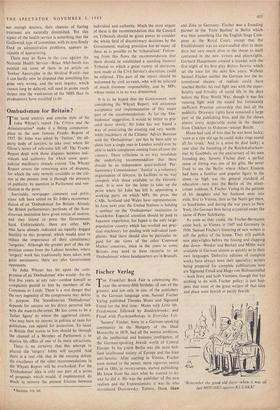Ombudsman for Britain?
THE lucid analysis and concise style of Sir 1 John Whyatt's report The Citizen and the Administration'" make it a fitting companion- piece to the now famous Franks Report of 1957. Sir John was asked by 'Justice,' the all- party body of lawyers, to take over where Sir Oliver's terms of reference left off. The Franks Report dealt with those disputes between indi- viduals and authority for which some quasi- judicial machinery already existed. The Whyatt Report covers the remaining area of disputes, for which the only remedy available to the citi- zen at the present time is through the pressure of publicity, by question in Parliament and ven- tilation in the press.
Inevitably, newspaper comment and politi- cians' talk have seized on Sir John's recommen- dation of an 'Ombudsman' for Britain. Already the British parliamentary partisans of the Scan- dinavian institution have given notice of motion; and they intend to press the Government hard. Unfortunately, there are other MPs who have already indicated an equally dogged hostility to this proposal, which would tend to reduce the importance of their constituency `surgeries.' Although the greater part of this op- position comes from the Labour benches, where 'surgery' work has traditionally been taken with great seriousness, there are also Government opponents.
Sir John Whyatt has hit upon the com- promise of an 'Ombudsman' who would—for the first five years, at any rate—confine himself to complaints passed to him by members of the Commons or Lords. There is a real danger that the very ingenuity of the compromise may defeat it purpose. The Scandinavian 'Ombudsman' depends for success on his direct personal link with the man-in-the-street. He has come to be a' 'father figure' to whom the aggrieved citizen, who may have no interest in politics or taste for politicians, can appeal for protection. To insist In Britain that access to him should be through the channel of a Member of Parliament is to deprive his office of one of its main attractions.
There is no certainty that this attempt to placate the 'surgery' lobby will succeed. And there is a real risk that in the ensuing debate the excellence of the other recommendations in the Whyatt Report will be overlooked. For the 'Ombudsman' idea is only one part of a series of proposals which would, if implemented, do much to remove the present friction between • Stevens, 10s. 6d. individual and authority. Much the most urgent of these is the recommendation that the Council on Tribunals should be given power to consider the whole field of discretionary decisions by the Government, making provision for us many of these as is possible to be `tribunalised.' Follow- ing from this flows the recommendation that there should be established a standing General Tribunal to which a great variety of decisions. now made at the Civil Service's discretion, could be referred. This part of the report should be welcomed by civil servants, who will be relieved of much tiresome responsibility, and by MN. whose status is in no way diminished.
It is to be hoped that the Government. now considering the Whyatt Report. will announce acceptance and implementation of this major part of the recommendations. As for the 'Om- budsman' suggestion, it would be better to pro- ceed more slowly. Sir John has not found a way of associating the existing and very worth- while machinery of the Citizens' Advice Bureaux with the 'Ombudsman': nor has he been able to show how a single man in London would ever be able to tackle complaints coming from all over the country. These criticisms in no way invalidate the underlying recommenda'tion that there should be an independent quasi-judicial 'Par- liamentary Commissioner.' Justice' is a voluntary organisation of lawyers; its facilities in no way compare with those available to the Govern- ment. It is now for the latter to take up the point where Sir John has left it, appointing a working party on which MPs. the press. the CABs. Scotland and Wales have representation. In June next year the United Nations is holding a seminar on the 'Ombudsman' institution in Stockholm. Especial attention should be paid to Japanese experience, for Japan is the only large- population country which has worked out prac- tical machinery for dealing with individual com- plaints. And there should also be particular re- gard for the views of the other Common Market: countries, since in the years to come Britons may need to have recourse to an 'Ombudsman' whose headquarters are in Brussels.














































 Previous page
Previous page